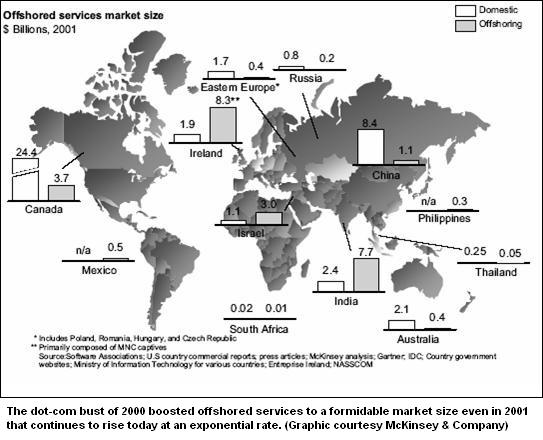Political History of Offshoring
In the early 20th century, two economists, John Maynard Keynes and Friedrich von Hayek, developed macroeconomic theories that have since dominated the economic policy of capitalist states. Keynes, who became increasingly popular during the Great Depression, believed general economic trends could overwhelm the specific behavior of individuals. In order to have an efficient and working economy, Keynes thought government needed to assert control over certain aspects of it. Ultimately, states established trade barriers, through tariffs, in addition to a variety of other methods to provide this control. In return, these states provided protection for their industries and the workers within those industries. Keynesian theory dominated capitalist economic policy from the Great Depression through the early 1980s.
The 1970s were filled with economic turmoil, mostly spurred by unpredictable fuel prices. It appeared, especially to US and British voters, that the Keynesian economic policies of the past had become obsolete. In 1979, British voters elected Margaret Thatcher as their prime minister, and in 1980 US voters elected Ronald Reagan as their president. Reagan and Thatcher’s election brought the beginning of the end of Keynesian economics, at least in the short term. Both these heads of state turned to the teachings of von Hayek who believed in trade liberalization and the free market economy. In other words, von Hayek preached what we now call "globalization."
Governed by the belief that free markets provided the answer to the economic difficulties experienced in the 1970s, Prime Minister Thatcher, President Reagan and their successors tore down barriers to trade through mechanisms like the General Agreement on Tariffs and Trade (GATT, which was established in 1948, but substantially reinforced from 1986-1993), the North American Free Trade Agreement (NAFTA), the formation of the European Union, and ultimately the World Trade Organization (WTO) which superceded the GATT in 1995. All these agreements and organizations were developed to promote free trade. In fact, upon the signing of the first GATT agreement, the US along with 22 other countries agreed to effectively lift 45,000 tariffs that existed.
The result of trade liberalization has been the susceptibility of American jobs, which traditionally have paid workers more than laborers outside US borders, to being shipped offshore as companies seek less expensive labor. The information technology (IT) industry has proved to be no exception.

In some senses, the IT industry came of age at an unfortunate time in economic history. Had the personal computer become popular in the 1950s, protection may have been given to IT industry workers. However, the IT industry gained momentum in the late 1970s and early 1980s, at precisely the same time that the US began shifting its focus to trade liberalization. As a consequence of this timing, no barriers were established to protect American IT workers from losing their jobs to overseas workers.
Initially, IT industry workers had little to fear from overseas workers. Until the dot com bust, which began in 2000, most of the jobs that had been offshored had been in manufacturing. While the computing industry had used the practice of offshoring prior to this time, it had been almost exclusively in the hardware manufacturing side of the business. Only a few of the largest companies had development centers overseas.
The IT Industry Today
However, the landscape of the IT industry has changed dramatically in recent years. Due to economic pressures as well as industry trends, which are discussed in The Economics Behind Offshoring, over half a million IT jobs have been outsourced by American companies to offshore facilities. Forrester Research, a consulting company, believes this number will grow to 830,000 by 2005 and to 3.4 million by 2015.
Although these numbers appear large, they may be misleading. Forrester also reported that 58 percent of the 139 North American IT firms they interviewed do not use offshore labor and do not plan to use offshore labor in the future. Furthermore, Forrester noted that less than 7 percent of jobs in the categories covered by the study, which include "management," "computer" and "legal," are actually sent offshore. In fact, the majority of IT jobs sent offshore have not been stripped from American workers. Instead, these jobs have been created and simply given to offshore workers.
Regardless of whether or not American jobs are greatly impacted by offshoring, there has been some political momentum behind increasing protection of IT workers. Both the federal government and state governments have been considering passing trade protecting legislation targeting the IT industry. For more information on this subject, please see the section on Legislation Aimed at Offshoring.
Does this legislation mean we are reverting back to Keynesian economic policies? Not really. Few attempts at legislation have aroused serious backing, and almost all of the legislation in this area is still pending a very doubtful ratification by congress, senate and the executive office. President Bush has made it clear that he does not intend on passing new legislation to protect IT jobs. Instead, he has worked hard to focus his job creation plan on tax breaks.
In conclusion, von Hayek’s economic principles will surely continue to impact the software industry. It appears as though Keynesian economics have lost in the short term. The questions that remain to be answered are what will become of the U.S. IT labor force, and how competitive can companies that do not utilize offshore outsourcing be?